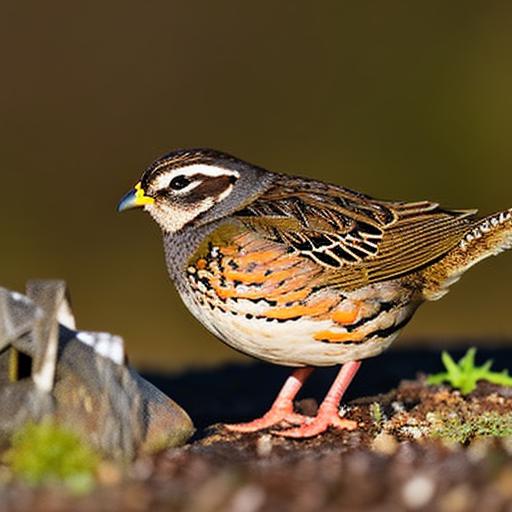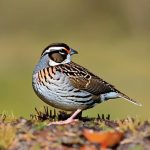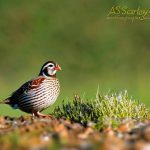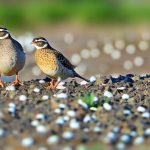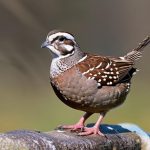Quails are small, ground-dwelling birds that are known for their social behavior and tendency to forage in groups. They are often found in open grasslands, agricultural fields, and brushy areas. Quails are primarily herbivores, feeding on seeds, grains, and small insects. They are also known to be attracted to gardens and yards that provide them with easy access to food and shelter. Understanding quail behavior is essential in effectively deterring them from your garden. By knowing their habits and preferences, you can implement strategies that will discourage them from causing damage to your plants and landscaping.
Quails are most active during the early morning and late afternoon, so it’s important to be vigilant during these times. They are also ground-nesters, so they prefer areas with low-lying vegetation where they can build their nests and seek shelter. Additionally, quails are attracted to areas with ample food sources, such as bird feeders, spilled seeds, and overgrown vegetation. By understanding these behaviors, you can take proactive measures to discourage quails from frequenting your garden. This may include creating physical barriers, using natural deterrents, implementing scare tactics, providing alternative food sources, and maintaining a clean and tidy garden.
Key Takeaways
- Quail are ground-dwelling birds that are attracted to gardens with dense vegetation and open spaces.
- Physical barriers such as fences and netting can effectively deter quail from entering gardens.
- Natural deterrents like predator urine and strong-smelling plants can help keep quail away from gardens.
- Scare tactics such as motion-activated sprinklers and decoy predators can startle and deter quail from gardens.
- Providing alternative food sources like bird feeders and designated feeding areas can redirect quail away from gardens.
Creating Physical Barriers
One effective way to deter quails from your garden is by creating physical barriers that prevent them from accessing the area. This can be achieved by installing fencing or netting around the perimeter of your garden. The fencing should be at least 2 feet high and buried at least 6 inches into the ground to prevent quails from burrowing underneath. Additionally, you can use bird netting to cover individual plants or rows of crops to protect them from quail damage. Another option is to use chicken wire or hardware cloth to create a barrier around vulnerable plants or garden beds.
In addition to fencing and netting, you can also use scare tape or reflective materials to create a visual barrier that deters quails from entering your garden. These materials create a shimmering effect in the sunlight, which can startle and confuse quails, making them less likely to approach the area. Another physical barrier option is to use motion-activated sprinklers or sound devices that startle quails when they approach the garden. These devices can be effective in deterring quails from entering the area without causing them harm.
Using Natural Deterrents
In addition to physical barriers, natural deterrents can also be effective in deterring quails from your garden. One natural deterrent is the use of predator decoys, such as plastic owls or snakes, which can create the illusion of danger and discourage quails from entering the area. These decoys should be moved regularly to prevent quails from becoming accustomed to their presence. Another natural deterrent is the use of strong-smelling plants, such as lavender, rosemary, or marigolds, which can repel quails with their pungent aroma.
Furthermore, you can use homemade or commercial repellents that contain ingredients such as garlic, hot peppers, or vinegar, which are known to be unappealing to quails. These repellents can be sprayed on plants or around the perimeter of the garden to discourage quails from foraging in the area. Additionally, you can use natural mulches, such as pine needles or wood chips, which can make it difficult for quails to access the soil and forage for food. By using natural deterrents in your garden, you can effectively discourage quails from causing damage to your plants and landscaping.
Implementing Scare Tactics
Scare tactics can be an effective way to deter quails from your garden by creating a sense of danger or discomfort that discourages them from entering the area. One common scare tactic is the use of noise-making devices, such as wind chimes, bells, or aluminum pie plates, which create a loud and unexpected sound when they move in the wind. These noises can startle quails and make them less likely to approach the garden. Another scare tactic is the use of motion-activated sound devices that emit loud noises or predator calls when quails enter the area.
Furthermore, you can use visual scare tactics, such as scarecrows or helium balloons with large eyespots painted on them, which create the illusion of a predator and deter quails from approaching the garden. These visual scare tactics should be moved regularly to prevent quails from becoming accustomed to their presence. Additionally, you can use motion-activated sprinklers that release a sudden burst of water when quails enter the area, which can startle and deter them from foraging in the garden. By implementing scare tactics in your garden, you can effectively discourage quails from causing damage to your plants and landscaping.
Providing Alternative Food Sources
One way to deter quails from your garden is by providing them with alternative food sources that will divert their attention away from your plants and landscaping. This can be achieved by setting up bird feeders in a different area of your yard and filling them with seeds and grains that are attractive to quails. By providing a designated feeding area for quails, you can encourage them to forage away from your garden and reduce the likelihood of them causing damage to your plants.
Another option is to plant cover crops or wildflowers that produce seeds and grains that are appealing to quails. By providing these alternative food sources in a designated area of your yard, you can attract quails away from your garden and minimize the impact of their foraging activities. Additionally, you can scatter birdseed or cracked corn in a different area of your yard to provide quails with an alternative food source that will discourage them from frequenting your garden. By providing alternative food sources for quails, you can effectively deter them from causing damage to your plants and landscaping.
Maintaining a Clean and Tidy Garden
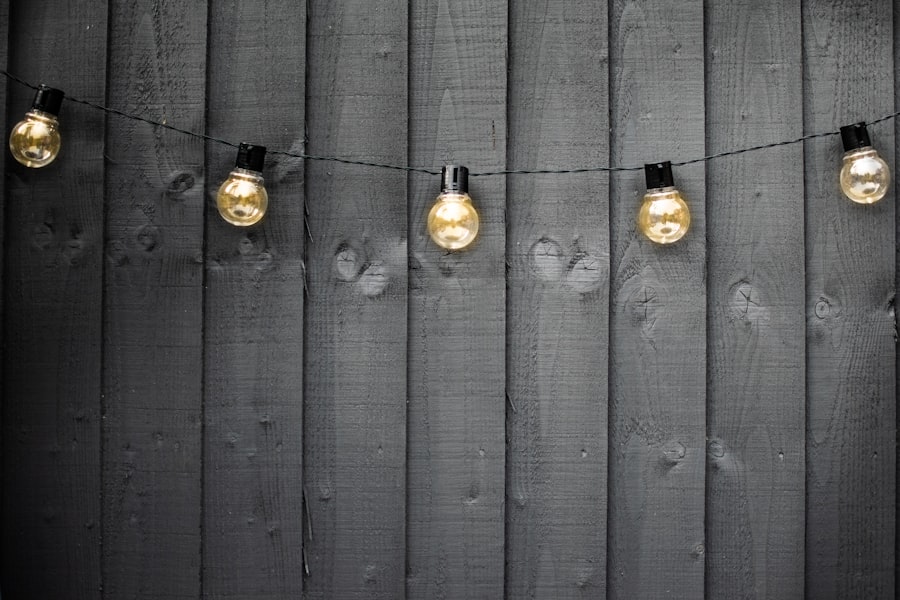
Maintaining a clean and tidy garden is essential in deterring quails from causing damage to your plants and landscaping. Quails are attracted to areas with overgrown vegetation, fallen fruits, and spilled seeds, so it’s important to keep your garden well-maintained to discourage them from frequenting the area. This may include regularly mowing the lawn, pruning overgrown shrubs and trees, and removing fallen fruits and seeds from the ground.
Additionally, it’s important to keep bird feeders clean and free of spilled seeds that may attract quails to your garden. By maintaining a clean and tidy garden, you can reduce the likelihood of quails foraging in the area and minimize the impact of their presence on your plants and landscaping.
Seeking Professional Help
If you have tried various deterrent methods and are still experiencing issues with quails in your garden, it may be time to seek professional help. A pest control expert or wildlife management professional can assess the situation and provide recommendations for effectively deterring quails from your garden. They may have access to additional deterrent methods or tools that are not readily available to homeowners.
Additionally, a professional can help you identify any underlying issues that may be attracting quails to your garden and provide guidance on how to address them. By seeking professional help, you can gain valuable insight into how to effectively deter quails from causing damage to your plants and landscaping.
In conclusion, understanding quail behavior is essential in effectively deterring them from your garden. By creating physical barriers, using natural deterrents, implementing scare tactics, providing alternative food sources, maintaining a clean and tidy garden, and seeking professional help when needed, you can effectively discourage quails from causing damage to your plants and landscaping. With proactive measures in place, you can enjoy a beautiful garden without the presence of unwanted quail visitors.
If you’re looking for ways to keep quail out of your garden, you may also be interested in setting up a chicken coop in your backyard. Check out this informative article on garden chicken coops to learn how to create a safe and secure space for your chickens while also protecting your garden from unwanted visitors.
FAQs
What are quail and why are they a problem in my garden?
Quail are small, ground-dwelling birds that can cause damage to gardens by eating plants, seeds, and insects. They can be a problem for gardeners because they can quickly decimate crops and cause significant damage to landscaping.
What are some effective methods for keeping quail out of my garden?
Some effective methods for keeping quail out of your garden include using physical barriers such as fences or netting, using scare tactics such as noise makers or visual deterrents, and removing food sources such as fallen seeds or insects.
Are there any natural deterrents that can help keep quail away from my garden?
Some natural deterrents that can help keep quail away from your garden include planting tall grasses or shrubs to provide cover for quail predators, using predator urine or scent deterrents, and creating an environment that is less attractive to quail by removing food sources and nesting areas.
What are some plants that quail are particularly attracted to, and how can I protect them?
Quail are particularly attracted to plants such as lettuce, strawberries, and small seeds. To protect these plants, you can use physical barriers such as netting or cages, plant them in raised beds or containers, or use natural deterrents such as predator urine or scent deterrents.
Are there any legal restrictions on how I can keep quail out of my garden?
It is important to check with local wildlife authorities to ensure that you are in compliance with any legal restrictions on how you can keep quail out of your garden. In some areas, quail may be protected species, and there may be regulations on how you can deter them from your property.
Meet Walter, the feathered-friend fanatic of Florida! Nestled in the sunshine state, Walter struts through life with his feathered companions, clucking his way to happiness. With a coop that’s fancier than a five-star hotel, he’s the Don Juan of the chicken world. When he’s not teaching his hens to do the cha-cha, you’ll find him in a heated debate with his prized rooster, Sir Clucks-a-Lot. Walter’s poultry passion is no yolk; he’s the sunny-side-up guy you never knew you needed in your flock of friends!

